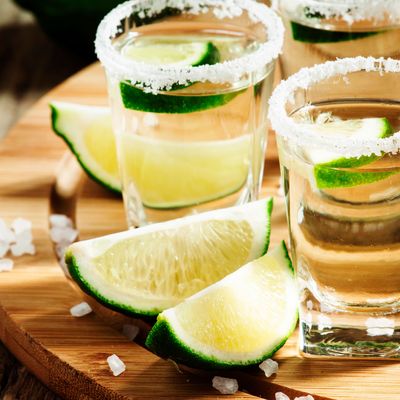
Margaritas might not be a superfood, but the Soul Cycle tribe seems pretty convinced that tequila counts as a wellness drink. Tales of health-minded tipplers abound, from accounts of celiac sufferers sipping the gluten-free spirit at happy hour to non-wheat-sensitive folks who just feel better on it.
“In my old age, for some reason, it is harder to process beer and wine,” said a 41-year-old Brooklyn-based director. “The word on the street was that tequila was less invasive. I stick with the blanco and I’m fine.” A Venice, California-based psychologist and Ashtanga yoga devotee is another convert: “I’d been a strict vodka drinker for years because I wanted to cut calories,” she said. “Now I feel like I’m taking a vacation, a year abroad with tequila. My understanding is that blanco or silver tequilas are the way to go— they’re cleanest and don’t give you a hangover.”
Blanco tequila is the purest type of 100 percent agave tequila — more pure than aged agave tequilas like reposados, or mixed tequilas that include other types of sugars, like mixtos. “Blanco or silver tequilas are the healthiest because the darker aged tequilas are often aged in barrels used for other types of alcohols,” explains Chris Chen, licensed acupuncturist and owner of the Simple Broth Bone Company.
Jason Eisner, beverage director at Gracias Madre, a vegan Mexican restaurant in West Hollywood name-checked in wellness holy bible Goop, adds: “José Cuervo — what most Americans think of as tequila — is 42 percent corn syrup, which gives you a horrible hangover. We have a lot of trainers and fitness gurus who come in and drink every day — and the way they’re able to do that is to stick to pure agave spirits. As long as you stay hydrated and don’t drink, like, a whole bottle, you’re fine. Not hungover.”
“The way you drink your tequila matters. Drinking tequila neat tends to be the preferred way for consumers looking for a healthier choice,” counsels Bertha Gonzalez-Nieves, co-founder and CEO of Casa Dragones and Maestra Tequilera.
But isn’t tequila most frequently associated with wanting to die the morning after? Maybe in the popular imagination, but not according to science. In addition to lacking that added corn syrup, “blanco tequila contains a lower level of congeners than dark spirits and red wine,” explains Emily Han, herbalist and author of Wild Drinks and Cocktails. “Congeners are substances like acetone and tannins that are produced during fermentation and aging, and studies show they may worsen hangovers.”
What about the other wellness buzz around tequila — that it’s good for dieting and blood-sugar levels? Nutritionist Nikki Ostrower, founder of NAO Nutrition in New York City, is skeptical of these assertions: “There’s always something coming up in the blogosphere,” she says. “It’s like ‘drink red wine,’ ‘drink tequila over bourbon.’”
Tequila adherents argue that because tequila is made from the blue agave plant, it contains sugars called agavins, shown to lower blood-sugar levels and to curb appetite in mice in a study by researcher Dr. Mercedes Lopez. And weight loss isn’t the only benefit. In another study, Lopez found that agavins have positive effects on bone density in mice — and thus possible future applications in preventing osteoporosis.
Articles with headlines like “Study shows that drinking tequila could help you lose weight” and “Drinking tequila could prevent osteoporosis” abound, but they usually fail to mention that any health benefits of agavins for humans (which have yet to be proven) are unrelated to drinking actual tequila. “My understanding is that agavin, a sugar found in the agave plant, may lower blood sugar, but it is not present in finished tequila,” says Emily Han.
Though agavins are the carbohydrate used to make tequila, because they are converted into ethanol (a.k.a. alcohol) in the fermentation process, they are not found in the finished product. So as appealing as the tequila diet might sound, you can’t actually drink away the pounds, or drink your way to strong bones.
Depressed by all this debunking? Maybe you need a drink. Tequila has one last thing supposedly going for it: Unlike every other alcohol, it’s said to be an upper, not a downer, and can lift your mood. “The joke about tequila is that it’s liquid cocaine,” remarked the Brooklyn director and blanco convert. Eisner added, “I’ve never seen somebody look unhappy when they’re drinking tequila. When you see Wall Street guys at a bar after work downing Manhattans, they look miserable. Tequila sippers — never.”
Sadly, the science doesn’t support this myth, either. “It’s a popular rumor,” says Emily Han. “Like all spirits, tequila is ethanol, which is a depressant.”
“The differences really are all in your head: alcohol is alcohol is alcohol,” agrees nutritionist Ostrower. She offers a possible explanation, though, for why people may feel this way: “If you drink a shot of tequila versus a can of beer — what’s in beer? A lot less alcohol, whereas the tequila will be more of a surge.” This might be the reason for the uplifting feeling many get.
So perhaps tequila is not the magical boozy wellness potion that many would like to believe it is. Still, if you want to imbibe, you could do worse. At the very least, you won’t wake up with a hangover.




